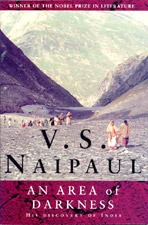Of Indian descent, Naipaul was born in Trinidad in 1932 and has been living in Britain since 1950. The Swedish Academy in Stockholm honors the writer "for having united perceptive narrative and incorruptible scrutiny in works that compel us to see the presence of suppressed histories".
 The Oxford-educated Naipaul examined post-colonial society. His literary domain has extended far beyond the West Indian island of Trinidad, his first subject, and now encompasses India, Africa, America from south to north, the Islamic countries of Asia and, not least, England. V.S. Naipaul most important works include A House for Mr Biswas (1961), A Bend in the River (1979), A Way in the World (1994) and An Area of Darkness (1964).
The Oxford-educated Naipaul examined post-colonial society. His literary domain has extended far beyond the West Indian island of Trinidad, his first subject, and now encompasses India, Africa, America from south to north, the Islamic countries of Asia and, not least, England. V.S. Naipaul most important works include A House for Mr Biswas (1961), A Bend in the River (1979), A Way in the World (1994) and An Area of Darkness (1964).
In his masterpiece, "The Enigma of Arrival", Naipaul visits the reality of England like an anthropologist studying some hitherto unexplored native tribe deep in the jungle. With apparently shortsighted and random observations he creates an unrelenting image of the placid collapse of the old colonial ruling culture and the demise of European neighbourhoods. Naipaul`s critical remarks and assessments of Muslim fundamentalism Paul Theroux, James Joyce`s Ulysses, and the homosexuality of E.M. Foster and John Maynard Keynes among other topics have been a source of controversy.
The early masterpiece of V. S. Naipaul`s brilliant career, "A House for Mr. Biswas" is an unforgettable story inspired by Naipaul`s father that has been hailed as one of the 20th century`s finest novels. In his forty-six short years, Mr. Mohun Biswas has been fighting against destiny to achieve some appearance of independence, only to face a lifetime of calamity. Shuttled from one residence to another after the drowning death of his father, for which he is inadvertently responsible, Mr. Biswas yearns for a place he can call home. But when he marries into the domineering Tulsi family on whom he indignantly becomes dependent, Mr. Biswas embarks on an arduous-and endless-struggle to weaken their hold over him and purchase a house of his own. A heartrending, dark comedy of manners, A House for Mr. Biswas masterfully evokes a man`s quest for autonomy against an emblematic post-colonial canvas.
In a vigilant style, which has been deservedly admired, he transforms rage into precision and allows events to speak with their own inherent irony. His fiction and especially his travel writing have been criticized for their allegedly unsympathetic portrayal of the Third World. His supporters argue that he is actually an advocate for a more realistic development of the Third World, that he is motivated by a passionate desire for the improvement of the countries which he writes about. Naipaul`s contempt for many aspects of liberal orthodoxy is uncompromising, yet he has exhibited an open-mindedness toward some Third World leaders and cultures that are not found in western writers. His works have become required reading in many schools within the Third World.
In several of his books Naipaul has discussed Islam and he has been criticized for dwelling on negative aspects. Naipaul`s support for Hindutva has also been controversial. He has been quoted describing the destruction of the Babri Mosque as a "creative passion", and the invasion of Babur in the 16th century as a "mortal wound." He views Vijayanagar, which fell in 1565, as the last bastion of native Hindu civilisation. In 1998 a controversial memoir by Naipaul`s sometime protegé Paul Theroux was published. The book provides a personal, though occasionally caustic portrait of the Nobel Laureate. The memoir, entitled Sir Vidia`s Shadow, was precipitated by a falling-out between the two men a few years earlier.
In 1971, he became the first Person of Indian origin to win a Booker Prize for his book In a Free State. His awards include the the following:
Booker Prize - 1971
Jerusalem Prize - 1983
Nobel Prize for Literature - 2001













